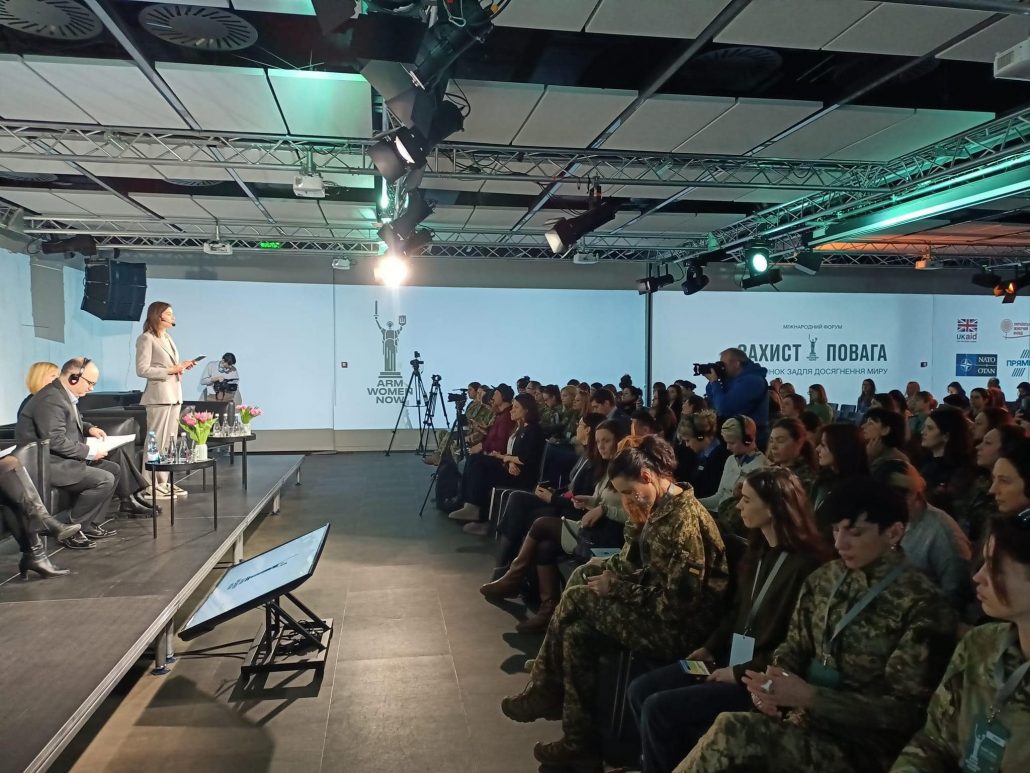
«Жінка не може керувати», «жінка не може воювати», «жінку треба захищати», «слабка стать» — ці та інші стереотипи вже давно неактуальні. Жінки самі обирають, ким і де бути. Однак навіть під час війни, коли жінки нарівні з чоловіками захищають державу, їм доводиться битися не тільки з ворогом, а й з упередженнями, що побутують у суспільстві.
Про те, чому стереотипам не місце в армії й чому чоловіки сприймають слово «фемінізм» як тригер, говорили на міжнародному форумі «Захист і повага. Роль жінок задля досягнення миру», організований соціальною ініціативою «Arm Women Now» .
Під час міжнародного форуму про роль жінок у захисті країни торкнулися таких тем, як стереотипи та перепони, з якими стикаються жінки, перебуваючи на різних посадах, зокрема у сфері безпеки та оборони. Адже жінкам складніше просуватися кар’єрною драбиною, їх постійно запитують про сімейний стан, не часто допускають до процесу ухвалення рішень.
Стереотипи з’явилися не за один день. За первісного ладу чоловік захищав, а жінка оберігала вогнище. Нині ж часи змінилися — і жінки можуть обирати для себе той шлях, який вважають за потрібне, тим паче коли в країні йде війна. Про це говорила заступниця міністра оборони Наталія Калмикова.
«Жінки, які працюють у сфері оборони, стикаються з двовимірною стереотипізацією: жінка не може воювати й жінка не може керувати».
«Ти дівчинка, а ти хлопчик, ти повинен, а ти повинна»
Багато стереотипів нав’язують під час навчання в школі та професійних закладах освіти.
Капітанка Національної гвардії Христина Бойчук розповідає, що 2019 року вона реалізовувала проєкт для учнів ліцеїв із військовою підготовкою й саме там помітила, як викладачі насаджують стереотипи.
«Викладачі нав’язують позицію: ти дівчинка, а ти хлопчик, ти повинен, а ти повинна. І наразі в армії стикаємося з гендерною історією: хто що повинен і хто що не повинен».
Читайте також: «Ми змушені воювати на два фронти»: історії жінок у війську
Стереотипи процвітають у всіх напрямках діяльності. І навіть переходячи зі сфери в сферу, жінкам доводиться долати одні й ті ж перешкоди.
«Я займалася бізнесом, там дивуються — мовляв, як це жінка може керувати металургійним заводом? Прийшла в політику — тут ситуація ще гірша. У збройних силах теж є стереотипи, на зразок «як це жінка може командувати», — говорить народна депутатка і військовослужбовиця Людмила Буймістер.
«Ми — ті, хто будує, обороняє й захищає»
Один зі стереотипів, що побутує в суспільстві, передбачає, що жінок треба захищати й оберігати. Стикаються з цим твердженням навіть ті військовослужбовиці, які мають колосальний бойовий досвід.
«Під час перебування в Рубіжному та Сіверодонецьку я зіштовхнулася з тим, що мене хотіли постійно кудись забрати і зберегти, — ділиться Христина Бойчук із позивним «Кудрява». — Але я казала: «Чекайте. Це ще я можу вас зберегти». Бо ми не жертви. Ми ті, хто будує, обороняє й захищає».
Часто військовослужбовиці стикаються з упередженням, що жінкам не можна керувати, бо це, мовляв, чоловіча справа. Тому так мало жінок на керівних посадах.
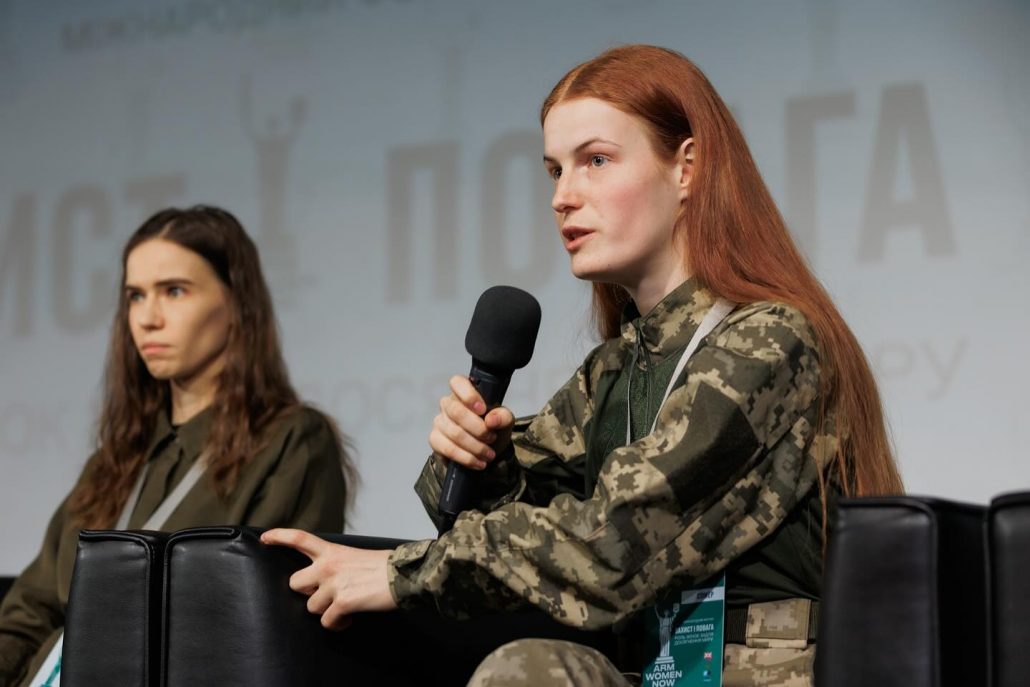
Військовослужбовиця Оксана Рубаняк («Ксена») говорить, що прийшла в армію і вже через два тижні навчань опинилася в бойових умовах, всього вчилася на практиці. Спочатку не знала навіть, що таке кулемет, але завдяки бойовому досвіду, наполегливості, організаторським здібностям, вмінню розв’язувати будь-які проблеми згодом стала командиркою. Вона сама запитувала чоловіків, як їм бути під керівництвом жінки.
«Коли мене призначили командиром, я запитувала хлопців: «А як вам узагалі йти за жінкою? Як там его?» Вони відповідали, що в мене є бойовий досвід, я відповідальна, закриваю матеріальний сектор, і тому питань немає. Якщо людина — професіонал і виконує обов’язки, то нічого кращого немає».
«Не зараз, не вчасно, недостатньо професійна»
В органах внутрішніх справ теж є низка проблем зі сприйняттям жінки, говорить начальниця управління моніторингу дотримання прав людини в МВС Ірина Зелена:
«Ми проводили ряд досліджень щодо сприйняття жінки в органах безпеки. І побачили, що на кожному кроці жінки стикаються з перепонами. На певних етапах кар’єрного зростання жінкам говорять: «ні, не зараз, ні, невчасно, ні, ти недостатньо професійна».
Сама Ірина також стикалася на початку кар’єри з тим, що їй сказали: дівчата в органах внутрішніх справ не дуже потрібні.
І куди ж без того, що для жінки на першому місці — краса?! Військовослужбовиці про це не згадували, однак стереотип транслював один зі спікерів форуму. Директор медичної частини центру комплексної реабілітації «Галичина» Данило Кривко, звертаючись до жінок, акцентував увагу на зовнішності
«Хочу подякувати за те, що є можливість брати участь у дискусії серед таких прекрасних жінок, які мало того, що красиві, ще й надзвичайно мужні…»
Як ламати стереотипи
Спікери та спікерки визнають, що попереду багато роботи з викорінення стереотипів та задля досягненні рівності. І відзначають, що війна прискорює еволюційні процеси.
Народна депутатка й військовослужбовиця Людмила Буймістер упевнена, що подолати стереотипи можна єдністю тих жінок, які вже в системі. А також не треба боятися чесно говорити про політику рівності у Верховній Раді.
«На сьогодні завдання кожної українки та українця — добиватися перемоги. І тому кожен і кожна мають обрати для себе, крім цивільної професії, додаткову — військову. 24 лютого (2022) ми робили неймовірне. Там неважливо було, ти жінка чи чоловік. Стереотипи ламаються єдністю жінок і в сфері безпеки та оборони, і загалом у країні».
На думку депутатки, запорукою успіху в боротьбі зі стереотипами може стати впровадження диджиталізованих та комп’ютеризованих систем.
«Армія — це не тільки про окопи. Ми сьогодні стоїмо на порозі нових підходів та технологій у веденні війни».
Людмила Буймістер говорить, що важливо, аби жінки були представлені на всіх рівнях, брали участь у планувальній та стратегічній діяльності.
«Ми хочемо якомога більшої інтеграції жінок саме на оперативному рівні, на рівні ухвалення рішень, а не тільки на обслуговуючих ролях. Щоб більше жінок брали безпосередню участь у плануванні бойових операцій, у їхній реалізації».
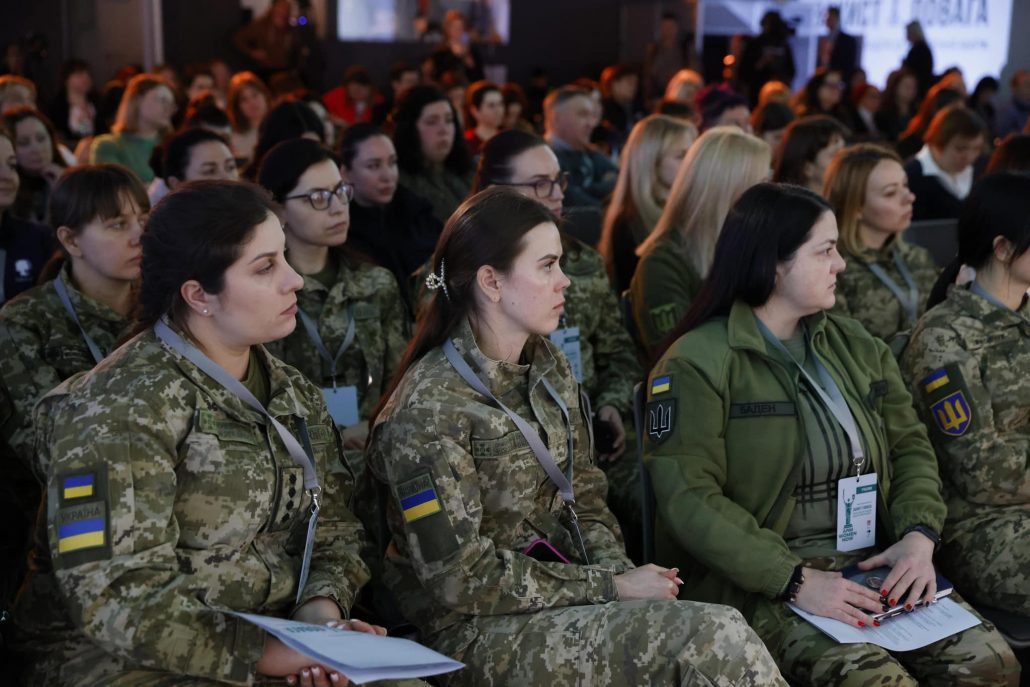
Наполегливість пробиває стіни
Начальниця управління моніторингу дотримання прав людини в МВС Ірина Зелена говорить, що важливий етап у подоланні стереотипів – зміна сприйняття ролі жінки в суспільстві і в органах внутрішніх справ зокрема.
«Мені вдавалося пробивати стіни завдяки наполегливості. Коли тебе сприймають як жінку, яка піде в декретну відпустку, тоді це спонукає ще більше доводити, що я обрала свій шлях і рухатимуся ним, незалежно від того, як ви бачите мене і що думаєте. Я раджу жінкам іти за своєю мрією».
Читайте також: «Пішла би без зайвих думок»: роздуми про обов’язкову мобілізацію для жінок
Ірина Зелена відзначила також, що важливо проводити навчання та системну роботу з особовим складом та з персоналом. Необхідно не просто взяти жінку на посаду, а й створити умови й розробити механізми, аби втримати її.
Христина Бойчук упевнена, що важливий приклад тих, хто вже перебуває в системі, а також створені державою належні умови.
«Тільки власним прикладом, доводячи, що ми в першу чергу професіоналки, можемо побороти це явище (стереотипи)».
Бойчук відзначила, що важливим для кар’єрного просування жінок є створення належних умов: щоби вистачало дитячих садочків, щоб жінки, виконуючи свої обов’язки, не переживали за те, чи нагодована їхня дитина.
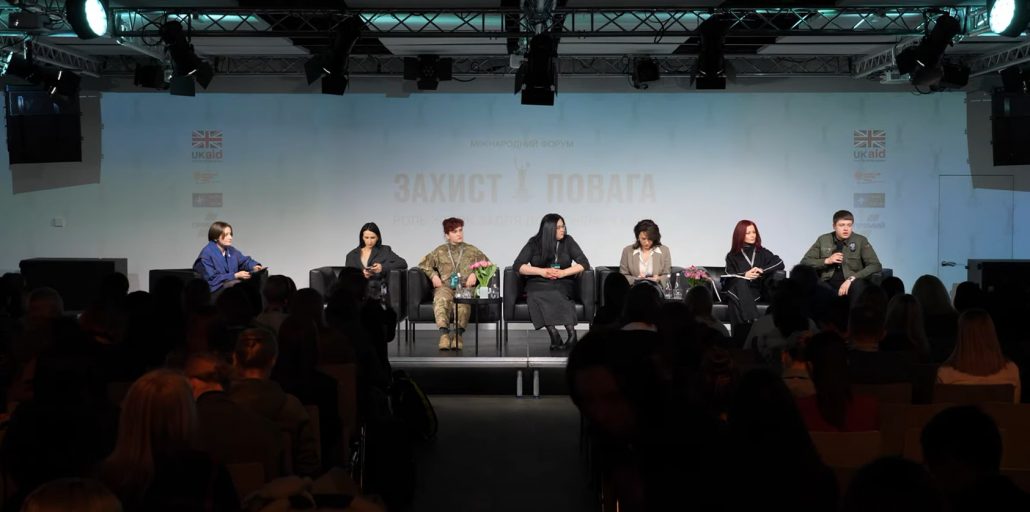
«Україна усвідомлює цінність гендерної перспективи»
Для того, аби ламати стереотипи, важливе визнання військовослужбовиць на найвищому політичному рівні, а також спосіб представленості їх у медіа та в публічному просторі.
Експертка з правових питань департаменту співробітництва Скандинавського центру з питань гендеру у військових операціях Паула Івановська розповіла про те, що їхній центр зібрав дані з відкритих джерел, аби проаналізувати, як українське й російське суспільство працювало в сенсі гендерної рівності до війни і як конфлікт змінив ставлення до гендерних ролей.
«У російських мобілізаційних матеріалах фігурує сильний мужик, який іде захищати батьківщину. І жінка, яка залишається вдома доглядати дітей. Весь наратив і аргументація, чому треба було вторгатися в Україну, побудовані на захисті «традиційних» російських цінностей. В Україні ж більш прогресивною є ідея відкидання гендерних стереотипів і норм. І жінки, і чоловіки зображуються як активні учасники в усіх сферах. Україна усвідомлює цінність гендерної перспективи й таким чином наближається до ЄС та НАТО».
Читайте також: Захисниці про свій шлях у армію: «Не слухайте, коли кажуть іти додому варити борщ»
Старша офіцерка департаменту співробітництва Скандинавського центру з питань гендерної рівності у військових операціях генерал-майорка Лінда Йохансон говорить, що для того, аби подолати стереотипи, жінки самі не повинні їх транслювати.
«Завдання всіх лідерів і лідерок — вести за собою й показувати приклад. Важливо також правильно проводити гендерний аналіз, завдяки якому буде розуміння, чи відповідаємо потребам жінок і чоловіків. Якщо немає знань у цьому напрямку, то можна їх здобути. Звернутися за допомогою до гендерних радників і радниць. Тобто подолати стереотипи допоможуть знання й лідерство».
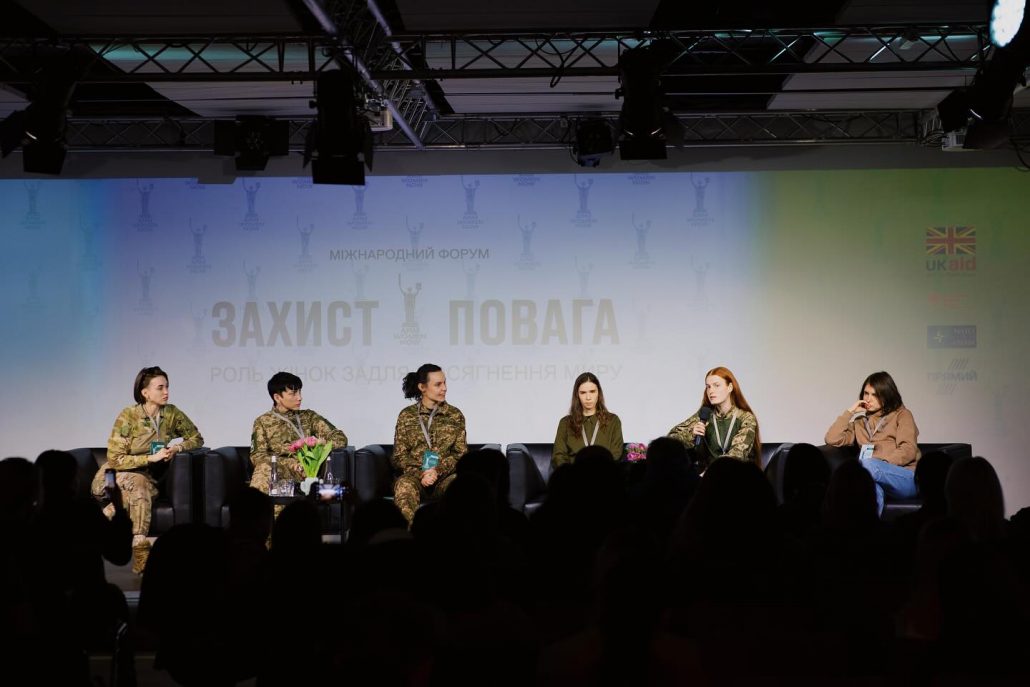
«Треба використовувати здібності жінок і на війні, і у відбудові»
Радник зі стабілізації посольства США в Україні Метью Джонсон говорив про те, що підхід до боротьби зі стереотипами має бути раціональним.
«Треба робити не те, що правильно, а те, що розумно і стратегічно виважено. Нині ніхто не тягає величезний меч на собі як у середньовіччі. І вже не може бути аргументом, що жінка не така сильна й не може цього зробити. Треба використовувати здібності жінок і на війні, і у відбудові. Ми вже почули голос жінок, і було би безглуздо проігнорувати їхні досягнення. А якщо жінка завагітніла, народила й хоче перший рік провести з родиною, це не має бути перешкодою для служби й будь-якої роботи в принципі».
Слова «гендер», «фемінізм», «сексизм» тригерять чоловіків
Юлія Микитенко, офіцерка ЗСУ, говорить про те, що чоловіки негативно реагують на слова «гендер», «фемінізм», «сексизм». Тому, виборюючи свої права, бійчиня змушена уникати їх у своєму лексиконі.
«Чоловіки настільки «агряться» на слова «гендер», «фемінізм» чи «сексизм»! Починається щось типу: «Ти, бахнута на голову феміністка». Ці слова для них — тригери. Я розумію, що це певний культурний рівень, але, на жаль, ми їх не можемо змінити. Тому конструктивний діалог краще вести без використання цих слів-тригерів».
«Важливо, щоб чоловіки говорили про жінок як професіоналок»
Заступниця міністра оборони Наталія Калмикова визнає, що жінкам складніше просуватися по кар’єрній драбині, однак технологізація війни має знімати ці бар’єри.
«Ми в міністерстві оборони намагаємося будувати систему просування кар’єрою, щоб лише професіоналізм мав значення».
Заступниця міністра зазначила, що міністерство працює над новим алгоритмом управління людським капіталом, який усуватиме під час прийому на роботу питання про сімейний стан та дітей. На думку Наталії Калмикової, у процесі викорінення стереотипів важливу роль грає комунікація та обмін досвідом. І тут важливо, щоб не тільки жінки говорили про себе, а й чоловіки говорили про жінок як професіоналок.
Голова місії України при НАТО Наталія Галібаренко відзначила, що
роль жінок у політиці, армії та в інших сферах життя стає все більш вагомою. Жінки не бояться перепон, вони ставлять перед собою високі цілі й досягають їх.
«Задача держави — створювати рівні права й можливості для жінок і чоловіків», — наголосила дипломатка.
Олена Кущенко
Fighting Stereotypes. What strategies are offered by military personnel and officials
“A woman cannot be the boss”, “a woman cannot fight”, “a woman must be protected”, “the weaker gender” — these and other stereotypes have long been outdated. Women themselves choose who and where to be. However, even during the war, when women defend the country on an equal footing with men, they have to fight not only with the enemy, but also with the prejudices that exist in society.
Why stereotypes have no place in the military and why men find the word “feminism” a trigger – these issues were discussed at an international forum “The international forum “Protection and Respect. The role of women to achieve peace”, organized by the social initiative “Arm Women Now”.
During the international forum on the role of women in the defense of the country, topics such as stereotypes and obstacles faced by women in various positions, in particular in the field of security and defense, were touched upon. After all, it is more difficult for women to advance on the career ladder, they are constantly asked about their marital status, and they are not often allowed to participate in the decision-making process.
Stereotypes did not appear overnight. In the ancient times, the man protected, and the woman guarded the hearth. Nowadays, times have changed — and women can choose the path for themselves, especially when there is a war in the country. Deputy Minister of Defense Nataliya Kalmykova spoke about this: “Women working in defense industry face two-dimensional stereotyping: a woman can’t fight and a woman can’t lead.”
«You are a girl and you are a boy, you both must do what you are supposed to do»
Many stereotypes are imposed at schools and professional educational institutions.
Captain of the National Guard Khrystyna Boichuk says that in 2019 she implemented a project for students of lyceums with military training and it was there that she noticed how teachers instilled stereotypes.
“Teachers impose a position: you are a girl and you are a boy, you must and you must. And currently in the army we are faced with gender history: who should do what and who should not do what.”
Stereotypes thrive in all areas. And when moving from sphere to sphere, women have to overcome exactly the same obstacles.
“I was engaged in business, there people are surprised — they say, how can a woman manage a metallurgical plant? In politics — here the situation is even worse. There are also stereotypes in the armed forces, such as “how can a woman command,” says People’s Deputy and military officer Lyudmila Buimister.
«We are the ones who build, defend and protect»
One of the stereotypes in society suggests that women should be protected. Even those female military personnel who have tremendous combat experience are faced with this statement.
“During my stay in Rubizhny and Siverodonetsk, I faced the fact that they wanted to take me somewhere and protect me,” shares Khrystyna Boychuk, nicknamed “Kudryava”. — But I said: “Wait. I can still save you.” Because we are not victims. We are the ones who build, defend and protect.”
Often, military personnel are faced with the prejudice that women cannot lead, because it is, they say, a man’s business. That is why there are so few women in leadership positions.
Military servicewoman Oksana Rubanyak (“Ksena”) says that she joined the army and after two weeks of training she found herself in combat conditions, learning everything in practice. At first, she didn’t even know what a machine gun was, but thanks to her combat experience, perseverance, organizational skills, and the ability to solve any problems, she later became a commander. She herself asked men how they feel about being under the leadership of a woman.
“When I was appointed commander, I asked the guys: “How do you even follow a woman? How’s the ego?” They answered that I have combat experience, I am responsible, I close the material sector, and therefore there are no questions. If a person is a professional and fulfills the duties, then there is nothing better.”
«Not now, not a good time, not professional enough»
Internal affairs bodies also have a number of problems with the perception of women, says Iryna Zelena, head of the human rights monitoring department at the Ministry of Internal Affairs:
“We conducted a number of studies on the perception of women in security agencies. And saw that women face obstacles at every step. At certain stages of career growth, women are told: “no, not now, no, not a right time, no, you are not professional enough.”
At the beginning of her career, Iryna herself was frequently told: girls in the internal affairs bodies are not really needed.
And where can we go without the fact that for a woman the first place is beauty?! The servicewoman did not mention it, but one of the speakers of the forum broadcast the stereotype. The director of the medical department of the complex rehabilitation center “Halychyna” Danylo Kryvko, addressing the women, emphasized the appearance
“I want to thank you for the opportunity to participate in the discussion among such beautiful women, who are not only beautiful, but also extremely courageous…”
How to fight stereotypes
Speakers admit that there is a lot of work ahead to eradicate stereotypes and achieve equality. And they note that war accelerates evolutionary processes.
People’s deputy and military servicewoman Lyudmila Buimister is sure that stereotypes can be overcome by the unity of those women who are already in the system. And one should not be afraid to speak honestly about the policy of equality in the Verkhovna Rada.
“Today, the task of every Ukrainian woman and man is to achieve victory. And that is why everyone should choose for themselves, in addition to a civilian profession, an additional one – a military one. On February 24 (2022), we did the unthinkable. It didn’t matter there if you were a woman or a man. Stereotypes are broken by the unity of women in the field of security and defense, and in the country in general.”
According to the deputy, the key to success in the fight against stereotypes can be the introduction of digitized and computerized systems.
“The army is not only about the trenches. Today, we stand on the threshold of new approaches and technologies in the conduct of war.”
Lyudmyla Buymister says it is important that women are represented at all levels and participate in planning and strategic activities.
“We want to integrate women as much as possible at the operational level, at the decision-making level, not just in service roles. We want more women to be directly involved in the planning of combat operations, in their implementation.”
Perseverance breaks through walls
Iryna Zelena, Head of the Human Rights Monitoring Department at the Ministry of Internal Affairs, says that an important step in overcoming stereotypes is to change the perception of the role of women in society and in the police force in particular.
“I managed to break through the walls through perseverance. When you are perceived as a woman who is going on maternity leave, it encourages me to prove even more that I have chosen my path and will follow it, regardless of how you see me and what you think. I advise women to follow their dreams.”
Iryna Zelena also noted that it is important to conduct training and systematic work with the personnel and staff. It is necessary not only to hire a woman, but also to create conditions and develop mechanisms to retain her.
Khrystyna Boichuk is convinced that the example of those already in the system is important, as well as the proper conditions created by the state.
“Only by our own example, proving that we are first and foremost professionals, can we overcome this phenomenon (stereotypes).”
Boichuk noted that it is important for women’s career advancement to create the right conditions: to have enough kindergartens so that women do not have to worry about whether their children are fed while performing their duties.
“Ukraine realizes the value of a gender perspective”
In order to break stereotypes, it is important to recognise women servicewomen at the highest political level, as well as the way they are represented in the media and in public space.
Paula Ivanovska, a legal expert at the Scandinavian Centre for Gender in Military Operations, said that their center had collected data from open sources to analyze how Ukrainian and Russian societies worked in terms of gender equality before the war and how the conflict changed attitudes to gender roles.
“Russian mobilization materials feature a strong man who goes to defend his homeland. And a woman who stays at home to look after the children. The whole narrative and argumentation of why it was necessary to invade Ukraine is based on the defence of ‘traditional’ Russian values. In Ukraine, the idea of rejecting gender stereotypes and norms is more progressive. Both women and men are portrayed as active participants in all spheres. Ukraine realizes the value of a gender perspective and is thus moving closer to the EU and NATO.”
Major General Linda Johanson, Senior Cooperation Officer at the Nordic Centre for Gender Equality in Military Operations, says that in order to overcome stereotypes, women themselves should not broadcast them.
“The task of all leaders is to lead and set an example. It is also important to conduct a proper gender analysis, which will help us understand whether we are meeting the needs of women and men. If you don’t have the knowledge in this area, you can acquire it. Seek help from gender advisors. In other words, knowledge and leadership will help overcome stereotypes.”
“It is necessary to use the abilities of women both in the war and in reconstruction”
Stabilization Advisor of the US Embassy in Ukraine, Matthew Johnson, said that the approach to combating stereotypes should be rational.
“It is not necessary to do what is right, but what is smart and strategically balanced. Nowadays, no one carries a huge sword like in the Middle Ages. And it can no longer be an argument that a woman is not so strong and cannot do it. It is necessary to use the abilities of women both in the war and in reconstruction. We have already heard the voice of women, and it would be foolish to ignore their achievements. And if a woman became pregnant, gave birth and wants to spend the first year with her family, this should not be an obstacle to service and any work in principle.”
The words “gender”, “feminism”, “sexism” trigger men
Yuliya Mykytenko, an officer of the Ukrainian Armed Forces, says that men react negatively to the words “gender”, “feminism”, “sexism”. Therefore, choosing her rights, the fighter is forced to avoid them in her lexicon.
“Men are so “heated” to the words “gender”, “feminism” or “sexism”! It starts with something like: “You crazy feminist.” These words are triggers for them. I understand that this is a certain cultural level, but unfortunately we cannot change them. Therefore, it is better to conduct a constructive dialogue without using these trigger words.”
“It is important that men talk about women as professionals”
Deputy Minister of Defense Natalia Kalmykova admits that it is more difficult for women to advance on the career ladder, but the technologicalization of war should remove these barriers.
“We at the Ministry of Defense are trying to build a career advancement system so that only professionalism matters.”
The deputy minister noted that the ministry is working on a new human capital management algorithm, which will eliminate questions about marital status and children during hiring. According to Natalia Kalmykova, in the process of eradicating stereotypes, communication and sharing of experiences play an important role. And here it is important that not only women talk about themselves, but also men talk about women as professionals.
The head of the Ukrainian mission to NATO, Nataliya Halibarenko, noted that
the role of women in politics, the army and in other spheres of life is becoming more and more significant. Women are not afraid of obstacles, they set high goals for themselves and achieve them.
“The task of the state is to create equal rights and opportunities for women and men,” the diplomat emphasized.


